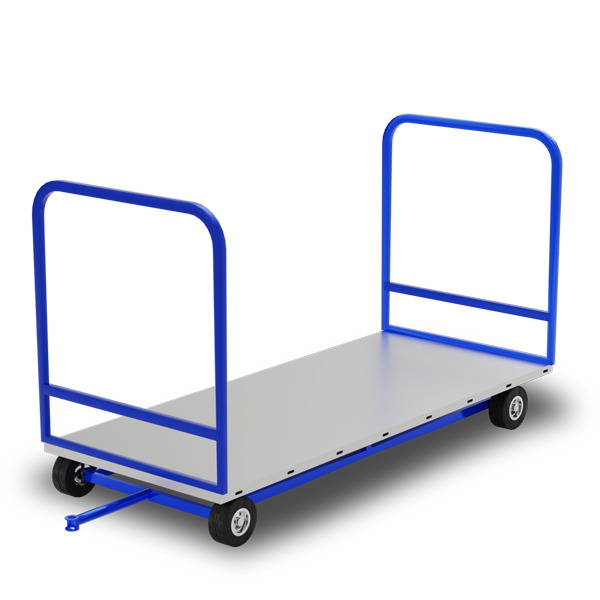Introduction
Flatbed trailers play a crucial role in various industries, serving as reliable workhorses for transporting heavy loads and oversized equipment. Their versatility, combined with their robust construction, make them indispensable assets in sectors such as construction, manufacturing, logistics, and agriculture. This article explores the features, benefits, and diverse applications of flatbed trailers, highlighting their significance in industrial settings.
-
Features of Flatbed Trailers
Flatbed trailers are characterized by their flat, open platform without sidewalls or a roof. This design allows for easy loading and unloading of goods from any side, making them ideal for carrying irregularly shaped or oversized cargo. They typically have a strong steel or aluminum frame, a flat deck, and various attachment points for securing loads using chains, straps, or bungee cords. Flatbed trailers are available in different lengths and widths, with some models featuring removable or foldable sides for added flexibility.

-
Benefits of Flatbed Trailers
2.1. Versatility: One of the primary advantages of flatbed trailers is their versatility. They can transport a wide range of goods, including construction materials, machinery, vehicles, agricultural equipment, and oversized cargo that cannot fit inside enclosed trailers. The absence of sidewalls and a roof allows for the transport of long, wide, or irregularly shaped items with ease.
2.2. Loading and Unloading Efficiency: The open design of flatbed trailers simplifies the loading and unloading process. Forklifts, cranes, or other machinery can access the cargo from any side, eliminating the need for a specific loading dock or ramp. This versatility saves time and effort, ensuring efficient operations and minimizing downtime.
2.3. Enhanced Safety: Flatbed trailers are designed to ensure the safety of both the cargo and the transport vehicle. The sturdy construction, along with various attachment points, helps secure the load firmly during transportation, reducing the risk of shifting or falling. Additionally, flatbed trailers provide excellent visibility for the driver, allowing for better maneuverability and reducing blind spots.
2.4. Cost-Effectiveness: Compared to specialized trailers designed for specific cargo types, flatbed trailers offer cost advantages. Their versatility allows for multi-purpose use, eliminating the need to invest in different trailers for various tasks. Additionally, the absence of sidewalls and a roof reduces weight, enhancing fuel efficiency and reducing transportation costs.
-
Maintenance and Safety Considerations
To ensure the optimal performance and longevity of flatbed trailers, regular maintenance is essential. Some key maintenance practices include:
4.1. Inspections: Regularly inspect the trailer’s structural components, such as the frame, axles, and suspension system, for any signs of damage, corrosion, or wear. Also, check the condition of tires, lights, brakes, and other safety features to ensure they are in proper working order.
4.2. Load Securement: Prioritize load securement by using appropriate straps, chains, or binders to secure the cargo firmly to the trailer. Regularly inspect and tighten the securing devices to prevent any shifting or movement during transit.
4.3. Cleaning and Protection: Clean the trailer regularly to remove dirt, debris, and corrosive materials that can damage the trailer’s surface. Apply protective coatings or treatments to prevent rust and corrosion, particularly if the trailer is frequently exposed to harsh environmental conditions.
4.4. Training and Safety Measures: Ensure that all personnel involved in operating and handling flatbed trailers receive proper training on load securement, trailer operation, and safety protocols. Emphasize the importance of adhering to weight limits, securing loads correctly, and following safe driving practices to prevent accidents and injuries.
-
Conclusion
Flatbed trailers are indispensable assets in various industrial sectors, offering unparalleled versatility, efficiency, and safety in transporting a wide range of goods. Their open design, robust construction, and ability to handle oversized and irregularly shaped cargo make them invaluable in construction, manufacturing, logistics, agriculture, and specialized cargo transportation. By understanding the features, benefits, and maintenance considerations associated with flatbed trailers, industries can leverage these essential tools to streamline operations, enhance productivity, and ensure the safe and reliable transportation of goods and equipment.
As industries continue to evolve, flatbed trailers will remain a vital component of the logistics and transportation infrastructure, serving as the backbone for moving heavy loads and oversized cargo. Their adaptability and reliability make them an integral part of industrial operations, contributing to the growth and efficiency of various sectors worldwide.








